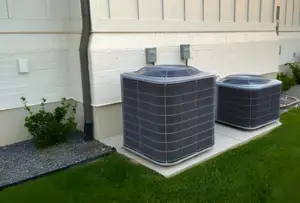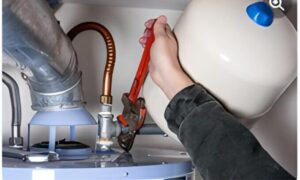As the summer heat continues to rise, the last thing you want is for your air conditioning system to fail you. Yet, we all know that air conditioning woes can strike at the most inconvenient times.
The good news is that there are expert solutions to these common problems that can help you restore the cool comfort you crave. From troubleshooting an AC that won't turn on to addressing thermostat glitches and low refrigerant levels, we will unravel the mysteries behind these issues and guide you towards effective solutions.
So, if you're tired of sweating it out and seeking ways to regain control over your indoor climate, join us as we uncover the secrets to troubleshooting air conditioning woes.
AC Won't Turn On
When troubleshooting air conditioning woes, one common issue that homeowners may encounter is when the AC won't turn on.
There are several possible causes for this problem.
The first possibility is a blown fuse or tripped circuit breaker. In this case, the solution would be to reset the circuit breaker or replace the blown fuse.
Another potential cause is broken or loose wiring, which would require inspection and repair by a professional.
Additionally, the thermostat may be glitching, either due to non-functioning or incorrectly calibrated settings. In such cases, it may be necessary to recalibrate or replace the thermostat.
Lastly, low refrigerant levels can also prevent the AC from turning on. This issue is typically caused by undercharging or leaks, which may require the expertise of HVAC professionals for repair or replacement.
Thermostat Glitches
Thermostat glitches can disrupt the proper functioning of an air conditioning system, leading to discomfort and inefficiency in cooling. Some common issues include non-functioning or incorrectly calibrated thermostats. Older dial-type thermostats are more prone to calibration issues, while newer programmable thermostats can be difficult to program.
In these cases, it may be necessary to consult the thermostat manual for proper programming or call an HVAC repair technician to recalibrate or replace the thermostat. These glitches can disrupt the temperature control and cause the system to run longer than necessary, resulting in higher energy consumption and reduced cooling efficiency.
Therefore, it is important to address thermostat glitches promptly to ensure optimal performance and comfort.
Low Refrigerant
Insufficient refrigerant levels can severely impact the performance and efficiency of an air conditioning system. Low refrigerant is typically caused by undercharging or leaks in the system. When the refrigerant level is low, the air conditioning unit will not be able to cool the space effectively, leading to reduced cooling efficiency and poor humidity removal.
Refrigerant is essential for the proper functioning of the AC system as it facilitates the heat exchange process. Leaks in the system may require the expertise of HVAC professionals for repair or even unit replacement.
It is important to address low refrigerant levels promptly to ensure optimal performance and energy efficiency of the air conditioning system.
Condenser Problems
The condenser coil plays a crucial role in the heat transfer process of an air conditioning system, ensuring efficient cooling and optimal performance.
However, condenser problems can disrupt the functionality of the system. One common issue is a dirty condenser coil, which can become exposed to dirt and pollutants over time. This accumulation of debris on the coil increases the workload and wear on the system, ultimately affecting cooling efficiency.
To address this problem, regular cleaning of the condenser coil is necessary. By removing the dirt and pollutants, the system can maintain its cooling efficiency and prevent further damage.
It is important to prioritize the maintenance of the condenser coil to ensure the longevity and effectiveness of the air conditioning system.
Frozen Evaporator Coil
Frozen evaporator coils can cause significant issues in the functionality and performance of an air conditioning system. When airflow is diminished, ice can form on the evaporator coil, leading to warm or no air from the supply registers. Restricted airflow can be caused by dirty filters, low refrigerant levels, or obstructed return air.
Regularly checking and replacing air filters is crucial in ensuring proper airflow through the system. Additionally, it is important to address any issues with low refrigerant levels or obstructions in the return air.
Frequently Asked Questions
How Do I Know if My AC Unit Is Low on Refrigerant?
If your AC unit is low on refrigerant, you may notice decreased cooling performance and humidity removal. Low refrigerant is often caused by leaks or undercharging. Consult an HVAC expert for repair or replacement.
What Are the Signs of a Malfunctioning Thermostat?
Signs of a malfunctioning thermostat include incorrect temperature readings, unresponsive controls, inconsistent heating or cooling, and frequent cycling on/off. Consult the thermostat manual for troubleshooting steps, but recalibration or replacement by an HVAC technician may be necessary.
How Often Should I Clean the Condenser Coil of My AC Unit?
The condenser coil of an AC unit should be cleaned regularly to ensure proper heat transfer and cooling efficiency. Dirty coils increase workload and wear on the system, leading to decreased performance.
Can a Frozen Evaporator Coil Be Fixed Without Professional Help?
Yes, a frozen evaporator coil can sometimes be fixed without professional help. Checking and replacing air filters, ensuring proper airflow, and addressing any obstructions can help resolve the issue.
How Can I Determine if My Ducts Are Leaking or Dirty?
Determining if ducts are leaking or dirty can be done by inspecting for improper airflow and uneven cooling, checking for tears or damage in the ductwork, and conducting regular inspections and repairs.
Conclusion
In conclusion, understanding and troubleshooting common air conditioning problems can help save time and money. By addressing issues such as blown fuses, thermostat glitches, low refrigerant levels, and dirty condenser coils, you can ensure optimal performance and extend the lifespan of your system.
Additionally, proper operation, regular maintenance, and addressing noisy systems and drainage difficulties are crucial for maintaining a comfortable living or working environment.
By following expert solutions, you can keep your air conditioning system running smoothly throughout the summer months.







